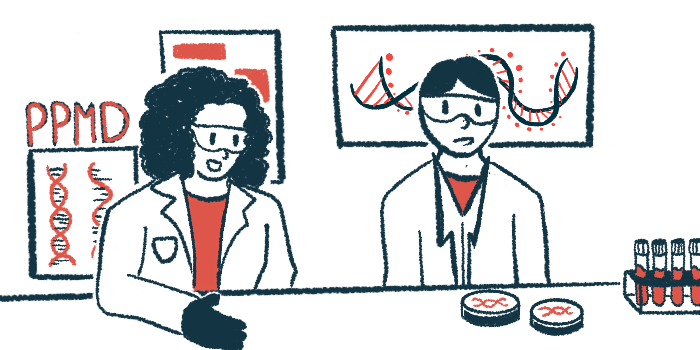PPMD 2024: Conference keynote address recalls 30 years of advocacy
President/CEO touts achievements, looks to the future of Duchenne, Becker MD

Parent Project Muscular Dystrophy (PPMD) held its first conference in 1994, in Orlando, Florida. A year later, at its meeting in Pittsburgh, fewer than two dozen people were in attendance, just a small group of parents of children with Duchenne muscular dystrophy (DMD) and a few scientists interested in the disease.
It was at that meeting that the group determined to push for better research and care, said PPMD President and CEO Pat Furlong, who delivered the keynote address as part of the 30th annual PPMD conference in its return this week to Orlando.
“We decided that if we all work together, if we shared our voices, we could do something and hopefully it would be something big,” Furlong said to a decidedly larger gathering, which is expected to draw more than 1,300 participants including people with DMD, family members, researchers, and pharmaceutical representatives.
In the three decades since its first conference, PPMD has helped the DMD community get legislation passed and conduct research, ushering in a new era of treatments for DMD and offering support and connection for families affected by DMD along with Becker muscular dystrophy (BMD), a related disorder.
“For 30 years, we’ve been trying to move the needle on the best kind of care and treatment possible for every person affected with Duchenne,” said Furlong, who noted the average life expectancy for someone with DMD was in the early teens when her own sons were diagnosed with the disease in the 1990s. But care has improved by leaps and bounds since then. Now the average life expectancy for someone with DMD is about 30 years and this number keeps going up as new therapies become available. “People are driving and people are dating … getting married, having their own children. I think the world has changed dramatically and I’m deeply grateful that it has.”
Becoming an advocate
In the 1980s, much of the focus of PPMD was on funding basic research, “the people with the mice,” said Furlong, who called the early work with animals a frustrating for advocates. Still, while animal models aren’t perfect, insights gleaned from basic research have been pivotal for advancing new DMD treatment methods that have recently been approved, such as gene therapy and exon-skipping therapies.
To help facilitate research, PPMD runs a patient registry, which has been collecting data on DMD for more than 15 years. Furlong urged anyone with DMD who isn’t yet part of it to join, adding its data is already being used by both basic scientists and pharma companies to advance treatments.
Along with pushing research forward, one of PPMD’s biggest priorities has been advocacy to urge governments to provide support for people with muscular dystrophy.
“By definition, when you get a diagnosis, you are an advocate,” Furlong said. “You have to educate yourself, you have to educate your family, you have to educate your community, and you have to educate your government because you are taxpaying citizens and you deserve their attention. So that’s exactly what we do.”
PPMD was instrumental in helping to craft and pass the Muscular Dystrophy Care Act, a federal bill signed into law by President George W. Bush in 2001 that seeks to boost DMD care. The legislation has “touched every single therapeutic that you’re seeing today,” said Furlong, who called establishing newborn screening for DMD and BMD the next big advocacy goal for PPMD.
Expanding newborn screening, certified care centers
Furlong said as more treatments for DMD become available, newborn screening will be essential so children with these conditions can enjoy the best possible outcomes.
Newborn screening involves systematically testing all babies for congenital disorders so they can get appropriate care as soon as possible, if it’s needed. Screening programs for other genetic disorders that have well-established treatments are widespread, but only a few states have such programs for DMD.
She said PPMD is pushing legislation to enact newborn screening and urged community members to contact local legislators about establishing screening programs where they live. “This is really, really important. All of you in this room should be in favor, hopefully, of newborn screening for all of the generations that come after us, because there will be a time when we have a known cocktail that we could have a baby diagnosed and we could treat them immediately,” Furlong said.
Another PPMD goal in the coming years is to continue expanding its network of certified care centers where people with DMD can access comprehensive, specialist care. There are more than 30 centers in the U.S., which provide care to around 4,700 patients. Furlong hopes to expand the network to offer resources to those who don’t yet have access.
“We know if we look at a map, there are some holes in the map. We’re trying to address that,” she said, adding PPMD is also working to bring young physicians into states with gaps in care to “have them start these critical clinical teams and get them in this network.”
And while PPMD continues to advocate and push research, the parent-founded organization will continue to act as a source of support for families touched by muscular dystrophy. There are dozens of PPMD connect groups across the U.S., plus specific groups for patients, siblings, parents, and grandparents.
“I always think about finding your us, finding the person you can lean on, the person you can call at 3 in the morning and say, I’m really struggling today,” Furlong said. “We have connect groups in many of the states. If you’re interested, we’d love to have you.”
Note: The Muscular Dystrophy News Today team is providing virtual coverage of the Parent Project Muscular Dystrophy Annual Conference (PPMD) June 27-29. Go here to see the latest stories from the conference.








